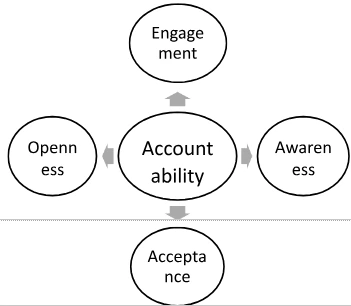Answer:
|
How to approach the question
- Introduction
- Introduce by defining integrity.
- Body
- Write the contributions of accountability in transparent governance.
- Write the contributions of accountability in efficient service delivery.
- Write the contributions of accountability in building public trust.
- Conclusion
|
Introduction
Accountability refers to the responsibility of individuals, organisations, or systems to answer for their actions, decisions, and policies. It involves being answerable and transparent in one’s conduct and being willing to accept the consequences of one’s actions, whether they are positive or negative.
Body
Cultivation of a strong sense of accountability contribute to transparent governance:
- Access to Information: Accountability requires providing accurate and timely information to the public. By cultivating a culture of accountability, governments are more likely to implement mechanisms such as Freedom of Information Acts or open data policies. Example The RTI Act, enacted in 2005.
- Whistleblower Protection: Accountability involves creating an environment where individuals feel safe and protected when reporting wrongdoing or exposing corruption. Example The Law Commission of India in 2001, had recommended that, in order to eliminate corruption, a law to protect whistleblowers was necessary
- Auditing and Oversight: Accountability entails independent auditing and oversight of government activities..
- Anti-Corruption Measures: By implementing and enforcing anti-corruption measures, such as codes of conduct, conflict-of-interest regulations, and asset disclosure requirements, governments establish a framework that holds public officials accountable for their actions.
- Citizen Engagement and Participation: Governments can cultivate a sense of accountability by establishing platforms for public consultation, feedback, and collaboration.
- Independent Judicial System: Accountability is strengthened when there is an independent and impartial judicial system.
Cultivation of a strong sense of accountability contribute to efficient service delivery:

- Clear Roles and Responsibilities: Accountability requires clearly defined roles and responsibilities for individuals and departments involved in service delivery.
- Performance Measurement and Targets: Accountability involves setting performance metrics and targets for service delivery. By establishing measurable goals and tracking progress, accountability mechanisms encourage individuals and organisations to focus on achieving desired outcomes efficiently.
- Resource Allocation and Efficiency: When individuals are accountable for their use of resources, they are more likely to manage them effectively, avoiding wastage or misappropriation. Example Kiran Bedi, a retired IPS officer, is known for her strong stance against corruption, commitment to reforming the police system, and efforts to empower women and promote education.
- Timeliness and Responsiveness: Accountability mechanisms, such as performance evaluations or citizen feedback systems, ensure that service providers prioritise responsiveness, leading to improved efficiency and customer satisfaction.
- Continuous Improvement: When individuals and organisations are accountable for their performance, they are more likely to actively seek ways to enhance efficiency and effectiveness. Example Shaktikanta Das, Governor of the Reserve Bank of India, has been involved in formulating monetary policies, managing the country’s finances, and ensuring financial stability.
- Streamlined Decision-Making: When individuals are accountable for their decisions, they are more likely to make well-informed and timely choices, reducing bureaucratic delays.
Cultivation of a strong sense of accountability contribute to public trust in the administrative machinery
- Ethical Conduct and Integrity: When individuals are held accountable for their behaviour, they are more likely to adhere to ethical standards and demonstrate integrity in their actions.
- Responsiveness to Citizen Concerns: When individuals and institutions are accountable for their performance, they are more likely to listen to public feedback, address grievances, and take corrective actions.
- Consistent and Fair Decision-Making: Accountability mechanisms ensure that decisions are made based on established rules, regulations, and objective criteria. This consistency and fairness in decision-making build trust.
- Independent Checks and Balances: Independent institutions, such as the judiciary, audit institutions, or ombudsman offices, play a crucial role in holding the administration accountable.
Conclusion
Overall, accountability serves as a mechanism for promoting transparency, fostering trust, and maintaining the integrity of individuals, organisations, and systems.
To get PDF version, Please click on "Print PDF" button.


Latest Comments